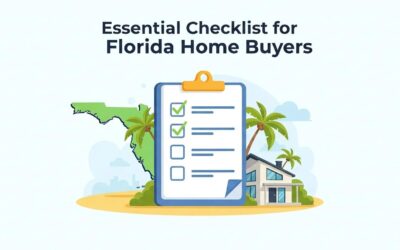In the Sunshine State of Florida, finding a residence to call home can be an exhilarating experience. With its warm climate, pristine beaches, and diverse real estate market, it is no wonder many aspire to purchase property in this coveted locale.
However, before embarking on the journey toward homeownership in Florida, potential buyers must carefully assess their financial capabilities and establish a well-informed budget. This critical step ensures financial stability and fosters belonging within the chosen community.
Aspiring homeowners must meticulously examine several factors to ascertain one’s home-buying budget in Florida. These include current income levels, savings, debt-to-income ratios, credit scores, prevailing mortgage rates, and additional costs associated with property ownership, such as taxes and insurance premiums.
By accurately evaluating these elements through rigorous analysis and prudent decision-making processes, prospective purchasers will be better equipped to identify their ideal price range for homes within the Floridian market.
Ultimately, establishing a realistic budget tailored to individual needs will pave the way for successful integration into a welcoming neighborhood – fulfilling that innate desire for connection and belonging in life’s most significant investment: one’s abode.
Assessing Your Financial Situation

Assessing one’s financial situation is a crucial initial step in determining an appropriate home-buying budget.
A key metric to consider when evaluating personal finances is the Debt-to-Income (DTI) ratio, which measures the proportion of monthly debt payments relative to gross monthly income. This ratio enables potential homeowners to evaluate their capacity to manage mortgage payments alongside debts such as credit card bills and student loans. Lenders are particularly interested in this ratio since it provides insight into the borrower’s ability to repay loans consistently.
Another essential aspect of financial preparedness involves maintaining an emergency fund covering at least three to six months of living expenses. This reserve is a safety net during unforeseen circumstances, ensuring stability and security amidst life’s unpredictability.
By establishing a robust emergency fund before purchasing a property, individuals demonstrate responsible fiscal management practices while fulfilling aspirations towards acquiring a piece of the Florida real estate landscape.
In light of these factors, prospective buyers should carefully assess their financial standing before embarking on the journey toward homeownership in Florida. Careful consideration of DTI ratios and building up solid emergency funds form the foundation for successful property acquisition endeavors.
Equipped with sound knowledge about their finances, aspiring homeowners can now proceed confidently toward understanding mortgage rates and loan options available in today’s market conditions, ultimately helping them make prudent decisions regarding long-term investments like property purchases in Florida.
Understanding Mortgage Rates And Loan Options

Delving deeper into the home-buying process, thoroughly understanding Florida’s mortgage rates and loan options is crucial. This knowledge will give prospective homeowners the tools to make informed decisions regarding their financial commitments.
As an essential aspect of determining one’s home-buying budget, considering various mortgage products can impact monthly payments and long-term affordability.
The first step towards comprehending mortgage intricacies involves obtaining pre-approval from lending institutions or banks. Mortgage pre-approvals not only offer insights into the maximum amount lenders are willing to finance but also enable borrowers to understand their creditworthiness and identify potential issues that may hinder their ability to secure favorable loan terms.
In addition, adjustable-rate loans present borrowers with opportunities for lower initial interest rates compared to fixed-rate mortgages; however, these savings must be carefully weighed against possible future rate increases that could lead to higher overall costs during the life of the loan.
Apart from selecting suitable mortgage types based on current financial conditions, aspiring homeowners should consider how external factors such as market fluctuations and economic trends might affect their borrowing capabilities over time. For instance, changing interest rates could render previously affordable homes unattainable if monthly payment requirements increase significantly due to rising costs.
Thus, having a comprehensive grasp of pertinent factors influencing mortgage rates and loan offerings enables individuals seeking property ownership in Florida to approach this significant investment decision with clarity and confidence. With this information, they can proceed further along the path toward successful homeownership by evaluating additional expenses associated with maintaining a residence throughout its lifespan.
Evaluating Additional Homeownership Expenses

Beyond the basic mortgage payment, there are various other expenses that potential homeowners must consider when determining their home-buying budget in Florida. These additional costs can significantly impact one’s ability to afford a particular property and maintain financial stability. As such, it is crucial for individuals to thoroughly assess these hidden costs before committing to any purchase.
- Property Taxes: In Florida, property taxes vary depending on the location of the residence and its assessed value.
- Insurance Premiums: Homeowners’ insurance premiums typically depend on factors like coverage amount, deductible level, and regional risks (such as hurricanes or flooding) specific to Florida.
- Maintenance and Repairs: Owning a home often involves routine maintenance tasks and unexpected repair needs, which can add up over time.
Understanding the full scope of homeownership expenses ensures prospective buyers make informed decisions about their budgets and long-term affordability. Additionally, knowing these extra costs will help prevent unwelcome surprises after moving into a new home.
It is essential for those looking to buy property in Florida to take all relevant factors into account when developing an accurate estimate of their overall housing expenses. Moreover, considering this comprehensive financial picture helps aspiring homeowners determine if they can manage monthly mortgage payments and ongoing costs associated with maintaining their properties responsibly.
This approach allows them to avoid overextending themselves financially while finding a suitable place to call home in the Sunshine State. Considering these considerations, examining local housing market conditions becomes another vital aspect of creating an effective budget strategy for purchasing real estate in Florida.
Considering The Local Housing Market

Investigating the local housing market is vital when determining one’s home-buying budget, particularly in an area as diverse and dynamic as Florida. The state boasts a wide range of property types, from beachfront condos to suburban single-family homes, with prices varying significantly based on location and regional affordability.
A thorough analysis of Florida market trends helps potential homeowners understand which areas might best suit their needs while staying within their financial means. One essential aspect to consider is the current supply and demand balance within various regions across the Sunshine State. By examining recent sales data alongside inventory levels, prospective buyers can gauge whether they are entering a buyer’s or seller’s market.
In turn, this information aids individuals in understanding how much negotiation power they may hold during purchase negotiations – a factor that could substantially impact final costs. Furthermore, factoring in additional economic indicators, such as employment rates and population growth, provides valuable context for predicting future price fluctuations.
Equipped with a comprehensive understanding of regional affordability and prevailing Florida market trends, aspiring homeowners can decide where to focus their search efforts. This localized knowledge enables buyers to target neighborhoods that align with their lifestyle preferences. It also supports establishing a realistic price range based on objective criteria rather than emotional attachments or subjective perceptions of value.
Consequently, these insights serve as the foundation for strategic investments in residential real estate throughout Florida by mitigating risk and maximizing return potential. With this solid groundwork established, setting specific parameters around one’s ideal property characteristics and price expectations becomes easier.
Setting A Realistic Price Range

One crucial aspect of the home-buying process is establishing a realistic price range. This requires an in-depth evaluation of one’s financial situation, including income, savings, debt-to-income ratio, and credit score. Moreover, it is essential to consider external factors such as market conditions and local property values in Florida.
Incorporating price negotiation strategies may also help prospective buyers obtain their desired homes at more affordable prices. Understanding down payment options is integral to setting a budget for purchasing a new home. In general, larger down payments lead to lower mortgage rates and monthly payments; however, they require substantial upfront capital from the buyer.
On the other hand, smaller down payments enable homeownership sooner but could result in higher interest rates or private mortgage insurance requirements. It is vital to balance these two factors while considering immediate finances and long-term plans. Quick finances and long-term goals. Determining a suitable budget for purchasing a residence involves carefully weighing several variables.
Consulting with experienced real estate agents or financial planners can offer valuable guidance regarding various elements involved in this process – including price negotiation strategies and potential sources of financing for both down payments and mortgages – thereby enabling aspiring homeowners to make informed decisions that best suit their unique needs and preferences within the constraints of local housing markets across Florida.
Frequently Asked Questions
How Can I Factor In Potential Changes In My Income Or Employment Status When Determining My Home Buying Budget?
In the turbulent ocean of financial uncertainty, income diversification is a sturdy lifeboat that can help navigate potential changes in one’s employment status.
When determining a home-buying budget, considering remote work opportunities and multiple income streams is essential for mitigating risks associated with job loss or reduced earnings.
As a real estate financial analyst would advise, incorporating these factors into calculations ensures more excellent stability during market fluctuations and personal setbacks.
By taking this approach, prospective homeowners create a haven for their finances and foster an environment where they can thrive within the community to which they belong, strengthening their sense of connection and support through times of change.
Are There Any Special Financial Considerations Or Incentives For First-Time Homebuyers In Florida?
In Florida, first-time homebuyers may benefit from various financial incentives and assistance programs to make homeownership more accessible.
Among such offerings are Florida grants and downpayment assistance initiatives that can significantly reduce upfront costs for eligible individuals.
Several local and state organizations, including the Florida Housing Finance Corporation (FHFC), provide funds to assist with down payments, closing costs, or mortgage interest rates through their Homebuyer Loan Program (HLP) as well as the Mortgage Credit Certificate Program (MCC).
By leveraging these resources, prospective buyers in Florida might sense belonging within their chosen communities while simultaneously alleviating some initial financial burdens associated with purchasing a property.
How Do Florida’s Property Taxes And Insurance Rates Compare To Other States, And How Might This Impact My Overall Budget?
Examining these factors’ implications on one’s overall budget is essential in considering Florida’s property taxes and insurance rates compared to other states.
Notably, Florida tax benefits include no state income tax, which can provide significant savings for homeowners. However, property tax rates tend to be slightly higher than the national average, with varying degrees of impact depending on the county.
Insurance comparisons also reveal that Florida has some of the highest homeowner insurance rates in the country due to its susceptibility to natural disasters such as hurricanes and flooding. Consequently, prospective homebuyers must weigh potential tax advantages against elevated insurance premiums when assessing their financial capacity for purchasing a property within this diverse and dynamic region.
How Can I Better Understand The Potential For Natural Disasters (E.G., Hurricanes, Floods) In Different Areas Of Florida And How This May Affect My Home Buying Budget And Insurance Costs?
To better understand the potential for natural disasters in various regions of Florida, it is essential to consider disaster preparedness strategies and flood zone mapping.
Disaster preparedness encompasses a wide range of actions that can minimize property damage and ensure safety during events such as hurricanes and floods. By researching local building codes, infrastructure resilience, evacuation plans, and community resources, prospective homeowners can make informed decisions about their future residence’s vulnerability to these hazards.
Additionally, assessing flood zone maps provided by the Federal Emergency Management Agency (FEMA) allows individuals to evaluate risks associated with specific properties based on historical data and projected flooding scenarios.
A thorough examination of disaster preparedness measures and flood zone classifications will contribute to an informed home-buying decision and provide insight into potential insurance costs related to hazard coverage within different areas of Florida.
How Can I Account For Potential Future Changes In The Local Housing Market, Such As Appreciation Or Depreciation, When Determining My Home Buying Budget?
Incorporating market fluctuations and neighborhood growth into the home-buying budget process necessitates a diligent analysis of local housing trends, economic indicators, and community development plans.
To account for potential appreciation or depreciation in property values, prospective buyers should consider historical price patterns, observe supply and demand dynamics within various submarkets, and remain attentive to changes in regional employment opportunities that could influence buyer competition.
Additionally, evaluating planned infrastructure improvements, commercial developments, and school district expansions can offer valuable insights into future neighborhood desirability.
By thoroughly examining these factors, individuals may develop an informed understanding of potential shifts in the local real estate landscape, enabling them to make strategic decisions regarding their home-buying budget while creating a sense of belonging rooted in thoughtful investment planning.
Key Considerations for Setting Your Home Buying BudgetConclusion
In conclusion, determining a home buying budget in Florida requires careful consideration of various factors such as potential changes in income or employment status, special financial incentives for first-time buyers, property taxes and insurance rates compared with other states, the impact of natural disasters on different areas of Florida, and the local housing market’s potential future appreciation or depreciation.
Prospective homeowners can make informed decisions about their home-buying budgets by thoroughly examining these aspects.
It is crucial to remember that navigating the Floridian real estate landscape may seem like an odyssey of Herculean proportions; however, being equipped with accurate knowledge and understanding will enable individuals to conquer this complex task successfully.
Ultimately, considering all relevant elements ensures that one’s investment remains financially sustainable while providing a comfortable living experience in the Sunshine State.







